Top 10 Best Crypto Exchanges & Crypto Trading Apps in 2024
top 10 best crypto exchanges and crypto trading apps & platforms. Compare features, fees, security & more for cryptocurrency trading & investing.
Choosing the best crypto exchanges and crypto trading apps in 2024 is essential for successful cryptocurrency trading and investing. With the rapidly evolving crypto market, finding a platform that offers the right balance of features, fees, and security can be challenging. In this article, we’ll explore the top 10 best cryptocurrency exchanges and cryptocurrency trading apps & platforms of 2024, comparing everything from fees to security to help you make informed decisions.
Based on insights from trusted sources like Forbes, Investopedia, NinjaPromo, and NerdWallet, we’ll highlight platforms that cater to both beginners and advanced traders. Whether you're new to crypto or a seasoned trader, these platforms are designed to offer optimal security, a wide selection of cryptocurrencies, and user-friendly interfaces.
What is a Crypto Exchange or Trading Platform, and How Does it Work?
A cryptocurrency exchange or trading platform is an online marketplace where users can buy, sell, and trade cryptocurrencies like Bitcoin, Ethereum, and other digital assets. These platforms function as intermediaries between buyers and sellers, facilitating transactions in much the same way as traditional stock exchanges, but with cryptocurrencies instead of stocks.
There are two primary types of exchanges: centralized exchanges (CEX) and decentralized exchanges (DEX). Centralized exchanges are managed by companies that oversee transactions, providing additional services like enhanced security, customer support, and built-in wallets. In contrast, decentralized exchanges enable peer-to-peer trading directly on the blockchain without an intermediary, offering more privacy but typically with fewer user-friendly tools.
To start using a crypto exchange, users create an account, complete identity verification (usually required on centralized platforms), and fund the account with fiat currency (such as USD or EUR) or another cryptocurrency. Once funded, users can place orders to buy or sell digital assets. Many platforms also offer tools for tracking prices, setting limits, and managing portfolios, making trading accessible for both beginners and experienced users.
Some exchanges provide advanced features such as staking (earning rewards for holding certain cryptocurrencies), margin trading (borrowing funds to increase trade size), and even futures contracts. These features are particularly attractive to seasoned traders seeking more sophisticated tools.
Security is a critical concern when choosing an exchange. Centralized exchanges often emphasize robust security measures, including two-factor authentication, encryption, and cold storage for digital assets. Some platforms also offer insurance policies to protect user funds. However, decentralized exchanges provide more privacy but leave the responsibility of securing assets in the hands of the user, offering less built-in protection.
User experience is another key factor. Platforms designed for beginners prioritize simplicity, offering intuitive interfaces that make it easy to navigate the world of cryptocurrency trading. On the other hand, more advanced traders often opt for exchanges with lower fees and more comprehensive trading options, which cater to a more experienced user base.
Cryptocurrency exchanges and trading platforms are essential to the cryptocurrency ecosystem, enabling users to trade digital assets efficiently. Whether you’re just starting or have extensive experience, understanding how these platforms work is essential for making informed trading decisions in the fast-paced world of cryptocurrency.
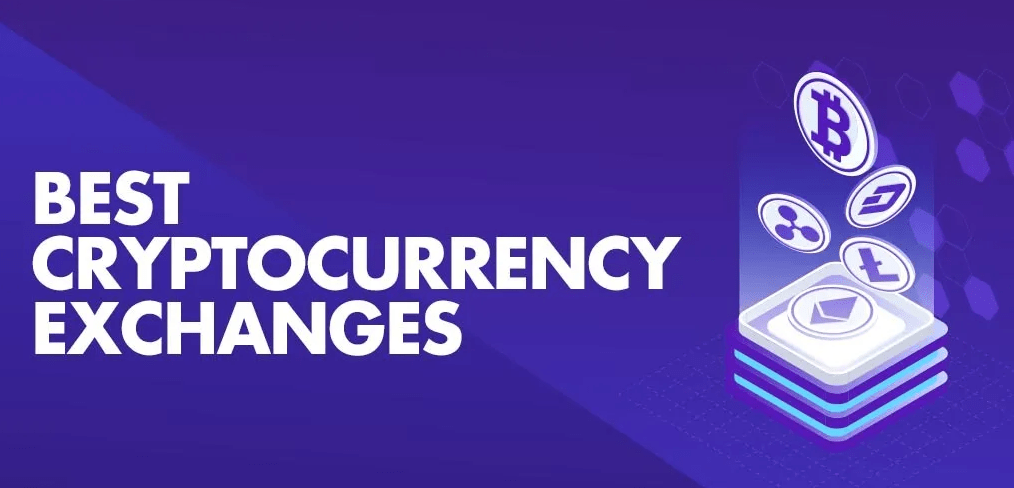
Types of Crypto Exchanges: Centralized vs. Decentralized
When choosing a digital asset exchange, one of the main considerations is deciding between centralized exchanges (CEX) and decentralized exchanges (DEX). Each type has its own strengths and weaknesses, catering to different user needs depending on their trading goals, experience level, and preferences for security and privacy.
Centralized exchanges (CEX) are the most widely used type. These platforms act as intermediaries between buyers and sellers, providing not only a marketplace for cryptocurrency trading but also added services like customer support, strong security features, and built-in wallets. One of the primary benefits of centralized exchanges is their user-friendly design, which makes them accessible to beginners who are new to trading. Their interfaces are often straightforward and easy to navigate, allowing newcomers to get started without feeling overwhelmed.
Another advantage of centralized platforms is high liquidity, which enables users to execute trades quickly at competitive prices. With more users actively trading, these exchanges often provide better price stability and lower spreads, making them attractive to both beginners and advanced traders. However, choosing a centralized exchange means trusting the platform to safeguard your funds and personal information, making security features like two-factor authentication, cold storage (offline wallets), and insurance policies crucial.
Decentralized exchanges (DEX), on the other hand, operate without an intermediary. They allow users to trade directly from their own wallets through the use of smart contracts on the blockchain. The biggest draw of DEXs is the level of privacy and control they offer. Since there’s no central authority overseeing trades, users retain full custody of their assets, and personal data is not shared with a central entity. However, this added privacy comes with more responsibility. Users are in charge of securing their own funds, and if something goes wrong, these platforms typically offer limited or no customer support.
For example, some exchanges have adopted a hybrid approach, offering both centralized and decentralized options. This gives users the flexibility to choose between the feature-rich environment of a centralized platform and the privacy and control of a DEX. The centralized version often includes advanced tools like staking and margin trading but requires users to trust the platform with their private keys. In contrast, the decentralized option allows users to maintain complete control over their assets but may lack the more advanced trading tools and support found on its centralized counterpart.
Ultimately, while decentralized exchanges may appeal to those who prioritize privacy and control, they can be more complex and less liquid than centralized alternatives. For many users, especially beginners, the simplicity, support, and added security of centralized platforms make them the preferred choice.
The decision between centralized and decentralized exchanges will largely depend on your personal preferences for security, privacy, and ease of use. Centralized exchanges offer more features, support, and ease of access, while decentralized exchanges provide greater autonomy and anonymity. Understanding these distinctions will help you choose the platform that best suits your needs.
Key Features to Look for in a Crypto Trading Platform
When selecting a cryptocurrency trading platform, certain key features can significantly impact your trading experience. Whether you're just starting or an experienced trader, finding a platform that aligns with your needs is essential for seamless trading and investing.
1. Security
Security is a top priority when it comes to cryptocurrency trading. Look for platforms that offer two-factor authentication, cold storage for assets (offline wallets), and encryption protocols to protect your funds. Some platforms also provide insurance for digital assets in case of hacks or breaches, giving you extra peace of mind.
2. Fees and Costs
Fees can have a significant impact on your profitability, so it's important to choose a platform with transparent and competitive fees. Many exchanges offer a tiered fee structure where higher trading volumes result in lower costs. Be sure to compare trading fees, withdrawal fees, and any hidden charges before selecting a platform.
3. Ease of Use
A user-friendly interface can make or break your experience, especially for beginners. Platforms that provide simple, intuitive navigation and accessible trading tools make it easier to manage your portfolio, place trades, and track market movements. A good platform will also offer resources and guides to help you understand how to trade effectively.
4. Supported Cryptocurrencies
Some platforms offer a wide variety of cryptocurrencies beyond Bitcoin and Ethereum, while others focus on a smaller selection of coins. If you're interested in trading altcoins or diversifying your portfolio, choose a platform that supports a broader range of digital assets. Keep in mind that liquidity also plays a role here — higher liquidity ensures that trades can be executed quickly at market prices.
5. Advanced Trading Features
For more experienced traders, advanced features such as margin trading, futures contracts, and staking options are crucial. These tools allow for more sophisticated trading strategies and the potential for higher returns. If you're looking to maximize your investments, select a platform that offers these advanced tools.
6. Customer Support
Reliable customer support is often overlooked but is a critical factor, especially in the fast-paced world of cryptocurrency. If an issue arises, whether it's a technical glitch or a question about fees, having access to prompt and knowledgeable support can make a big difference.
The best digital asset trading platforms offer a combination of strong security, reasonable fees, user-friendly design, and a broad selection of cryptocurrencies. Whether you're a beginner or an advanced trader, understanding these key features will help you choose a platform that supports your trading goals.
Top 10 Best Crypto Exchanges for 2024
Navigating the world of cryptocurrency trading can be overwhelming, especially with the numerous exchanges available today. In 2024, the best crypto platforms not only offer a platform for buying and selling cryptocurrencies but also provide essential features like security, user experience, and diverse trading options. Here's a detailed look at the top exchanges you should consider.
| Exchange | Overview | Key Features | Fees | Security Measures | Supported Cryptocurrencies | User Experience | Pros | Cons | Best For |
|---|---|---|---|---|---|---|---|---|---|
| Kraken | Established in 2011, known for low fees and security. | Advanced trading options, educational resources. | Maker: 0.16% to 0.00%, Taker: 0.26% to 0.10%. | Two-factor authentication, cold storage. | Over 185 cryptocurrencies. | Complex interface for beginners. | Strong security, low fees, variety of cryptocurrencies. | Complex for beginners, slow verification. | Experienced traders needing low fees. |
| Coinbase | Popular among beginners since 2012. | User-friendly, Coinbase Earn program. | Varies by payment method, generally higher. | Two-factor authentication, insurance for assets. | Popular cryptocurrencies. | Intuitive design for easy navigation. | User-friendly, strong security, educational resources. | Higher fees, limited coins, regulatory restrictions. | New users needing a straightforward platform. |
| Binance | Largest exchange, founded in 2017. | Over 350 cryptocurrencies, advanced tools. | Maker: 0.00% to 0.10%, Taker: 0.10% to 0.04%. | Two-factor authentication, security audits. | Extensive cryptocurrency range. | Feature-rich interface, suitable for experienced traders. | Low fees, extensive selection, advanced features. | Availability restrictions, complex interface. | Traders seeking variety and low costs. |
| Crypto.com | Rapidly growing exchange since 2016. | Crypto debit card, mobile wallet, staking options. | Varies based on volume, competitive. | Past security incidents, two-factor authentication. | Over 100 cryptocurrencies. | Feature-rich but complex for newcomers. | Wide range of services, competitive fees. | Security concerns, complex interface. | Users looking for an all-in-one solution. |
| Gemini | Founded by the Winklevoss twins in 2014. | Simple interface, regulatory compliance. | Relatively high compared to competitors. | Cold storage, insurance for assets. | Limited selection of popular cryptocurrencies. | User-friendly design. | Strong security, regulatory compliance. | High fees, limited assets. | Users prioritizing security and compliance. |
| KuCoin | Known for a wide selection of altcoins. | Over 700 cryptocurrencies, competitive fees. | Maker: 0.10% to 0.01%, Taker: 0.10% to 0.07%. | Two-factor authentication, withdrawal whitelists. | Wide variety of cryptocurrencies. | Feature-rich but complex for beginners. | Extensive selection, low fees. | Potential security concerns, complex interface. | Altcoin enthusiasts. |
| Bitstamp | Established in 2011, known for security. | User-friendly platform, low fees. | Maker: 0.50% to 0.10%, Taker: 0.50% to 0.20%. | Two-factor authentication, cold storage. | Popular cryptocurrencies. | Simple and straightforward interface. | Strong security, low fees. | Limited trading options. | Users wanting reliability and security. |
| Bybit | Specializes in derivatives trading. | High liquidity, advanced trading tools. | Maker: -0.025%, Taker: 0.075%. | Two-factor authentication, cold storage. | Popular cryptocurrencies. | Designed for experienced traders. | Specialization in margin trading. | Limited crypto selection. | Experienced margin traders. |
| OKX | Leading global exchange with diverse offerings. | Over 400 pairs, advanced trading options. | Maker: 0.10% to 0.06%, Taker: 0.15% to 0.10%. | Advanced encryption, multi-level authentication. | Wide range of cryptocurrencies. | Complex for beginners, rich in features. | Diverse trading options, strong security. | Challenging for new users. | Traders seeking variety and security. |
| BitMart | User-friendly exchange with diverse offerings. | Supports numerous cryptocurrencies, staking options. | Competitive trading fees around 0.10%. | Two-factor authentication, regular audits. | Popular and emerging cryptocurrencies. | Accessible for beginners and experienced traders. | User-friendly design, diverse offerings. | Lower liquidity compared to larger exchanges. | Users wanting a straightforward trading experience. |
Kraken
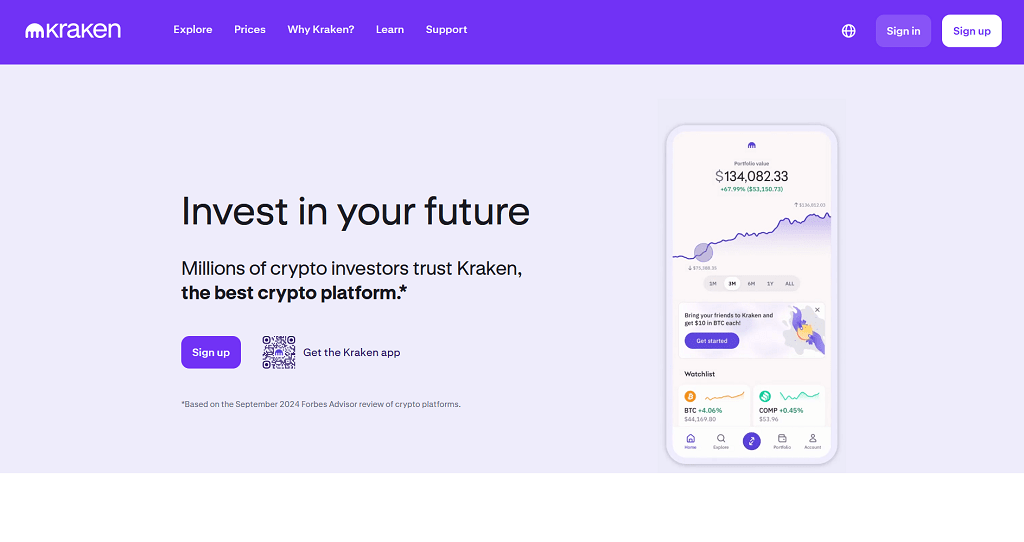
Overview
Kraken is a well-established cryptocurrency exchange founded in 2011, known for its low fees and robust security features.
Key Features
- Advanced trading options including margin and futures trading
- Comprehensive educational resources for users
- User-friendly interface
Fees
Kraken offers competitive fees, with maker fees ranging from 0.16% to 0.00% and taker fees from 0.26% to 0.10%, which decrease with higher trading volumes.
Security Measures
Kraken has a strong reputation for security, utilizing measures such as two-factor authentication, cold storage for funds, and regular security audits.
Supported Cryptocurrencies
The platform supports over 185 cryptocurrencies, including popular options like Bitcoin and Ethereum.
User Experience
While Kraken offers a wealth of features, the interface can be complex for beginners, requiring some time to navigate effectively.
Pros and Cons
- Pros: Strong security measures, low fees, a wide variety of cryptocurrencies.
- Cons: Complex interface for beginners, slow account verification process.
Who Should Use This Exchange?
Kraken is best suited for experienced traders who require low fees and advanced trading features.
Conclusion
With its strong security and comprehensive offerings, Kraken remains a reliable choice for digital asset trading.
Coinbase
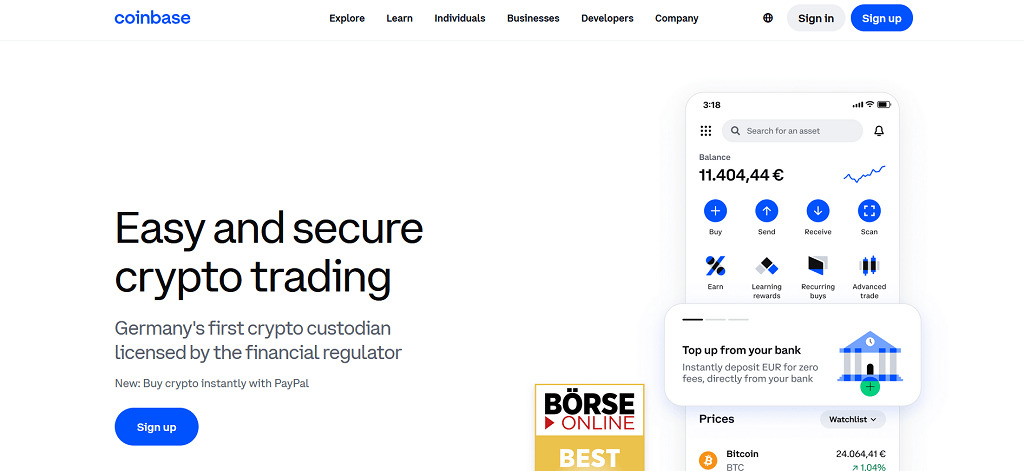
Overview
Coinbase is one of the most popular cryptocurrency exchanges, especially among beginners, founded in 2012.
Key Features
- User-friendly interface designed for novice traders
- Coinbase Earn program for learning about crypto
- Mobile app for trading on the go
Fees
Fees vary based on the payment method and region, generally higher than many competitors.
Security Measures
Coinbase implements robust security measures, including two-factor authentication and insurance for digital assets.
Supported Cryptocurrencies
Supports a limited selection of popular cryptocurrencies, including Bitcoin, Ethereum, and Litecoin.
User Experience
Coinbase is known for its intuitive design, making it easy for new users to start trading.
Pros and Cons
- Pros: User-friendly platform, strong security measures, educational resources.
- Cons: Higher fees, limited selection of cryptocurrencies, regulatory restrictions in some areas.
Who Should Use This Exchange?
Best for beginners looking for a straightforward way to buy and sell cryptocurrencies.
Conclusion
Coinbase’s focus on usability and security makes it an excellent entry point for those new to digital asset trading.
Binance
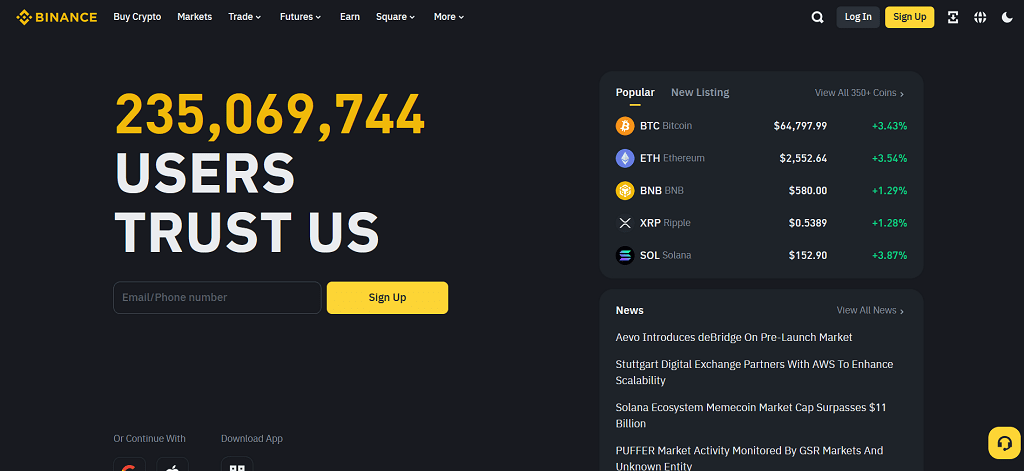
Overview
Binance is a leading global cryptocurrency exchange, founded in 2017, renowned for its vast selection of trading options.
Key Features
- Over 350 cryptocurrencies available
- Advanced trading tools for experienced users
- Mobile app for easy trading
Fees
Binance offers low fees, with maker fees between 0.00% and 0.10%, and taker fees from 0.10% to 0.04%, which decrease with higher trading volumes.
Security Measures
The platform employs strong security protocols, including two-factor authentication and regular security audits.
Supported Cryptocurrencies
Offers an extensive range of cryptocurrencies, making it a preferred choice for traders seeking variety.
User Experience
The platform's feature-rich interface may be overwhelming for beginners but is appreciated by experienced traders.
Pros and Cons
- Pros: Extensive selection of cryptocurrencies, low fees, advanced trading features.
- Cons: Availability restrictions in certain regions, complex interface for new users.
Who Should Use This Exchange?
Best suited for experienced traders looking for low fees and a wide array of trading options.
Conclusion
Binance continues to be a dominant player in the crypto market, offering significant advantages for serious traders.
Crypto.com
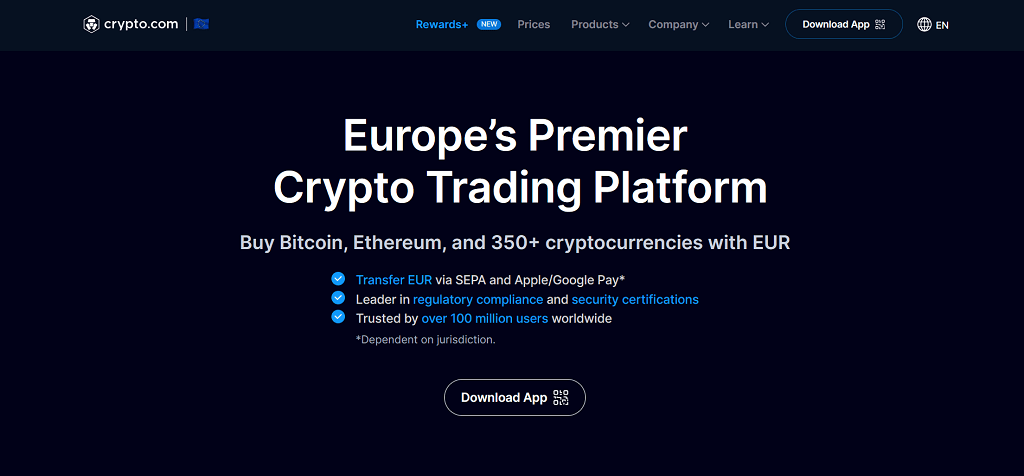
Overview
Crypto.com is a rapidly growing cryptocurrency exchange established in 2016, known for its diverse features and services.
Key Features
- Offers a crypto debit card for spending at millions of merchants
- Mobile wallet and investment products
- Competitive staking options
Fees
Fees vary based on trading volume and user status, generally competitive within the industry.
Security Measures
Crypto.com has faced security incidents in the past but employs measures like two-factor authentication and cold storage for user funds.
Supported Cryptocurrencies
Supports a broad selection of over 100 cryptocurrencies.
User Experience
While the platform provides numerous features, it may appear complex for those new to crypto.
Pros and Cons
- Pros: Wide range of services, including a debit card, and competitive fees.
- Cons: Security concerns from past incidents, complicated interface for beginners.
Who Should Use This Exchange?
Ideal for users looking for an all-in-one platform to manage their crypto assets and spend them conveniently.
Conclusion
Crypto.com is a comprehensive platform that appeals to a diverse range of users but requires caution regarding security.
Gemini
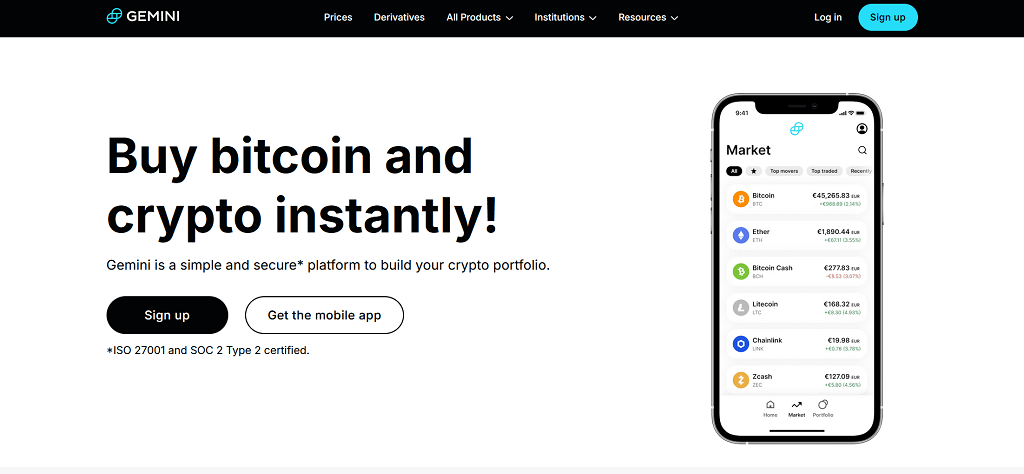
Overview
Gemini is a US-based cryptocurrency exchange founded by the Winklevoss twins in 2014, focusing on security and regulatory compliance.
Key Features
- Simple and intuitive interface
- Strong emphasis on regulatory compliance
- Educational resources for users
Fees
Fees can be relatively high compared to other exchanges, especially for smaller transactions.
Security Measures
Gemini stores the majority of its users’ funds in cold storage and offers insurance coverage for digital assets.
Supported Cryptocurrencies
Offers a limited selection of popular cryptocurrencies, including Bitcoin and Ethereum.
User Experience
The platform is designed to be user-friendly, making it easy for newcomers to navigate.
Pros and Cons
- Pros: Strong security measures, regulatory compliance, user-friendly design.
- Cons: Limited range of assets, higher fees compared to competitors.
Who Should Use This Exchange?
Best for users who prioritize security and regulatory compliance in their trading experience.
Conclusion
Gemini’s commitment to security and user-friendly design makes it a trustworthy option for cryptocurrency trading.
KuCoin
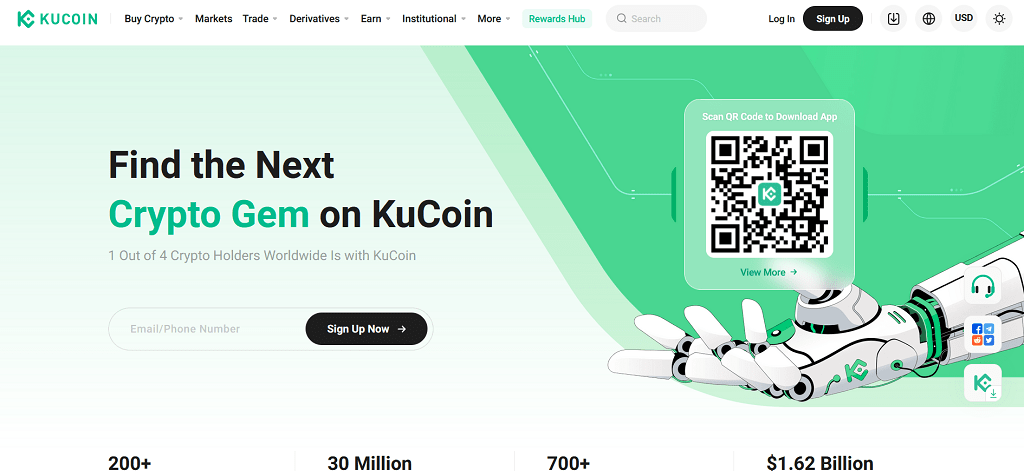
Overview
KuCoin is recognized for its extensive selection of altcoins and advanced trading features, catering to a diverse range of traders.
Key Features
- Over 700 cryptocurrencies available
- Competitive trading fees
- Advanced trading tools
Fees
Maker fees range from 0.10% to 0.01%, and taker fees from 0.10% to 0.07%.
Security Measures
KuCoin employs several security measures, including two-factor authentication and withdrawal whitelists.
Supported Cryptocurrencies
Supports a wide variety of cryptocurrencies, making it a popular choice for altcoin enthusiasts.
User Experience
The platform offers numerous features, which may be overwhelming for beginners but is beneficial for seasoned traders.
Pros and Cons
- Pros: Extensive selection of cryptocurrencies, low fees, advanced features.
- Cons: Potential security concerns, complex interface for newcomers.
Who Should Use This Exchange?
Ideal for traders looking to explore new and niche altcoins in a competitive trading environment.
Conclusion
KuCoin’s diverse offerings and user-friendly trading tools make it a top choice for altcoin enthusiasts.
Bitstamp
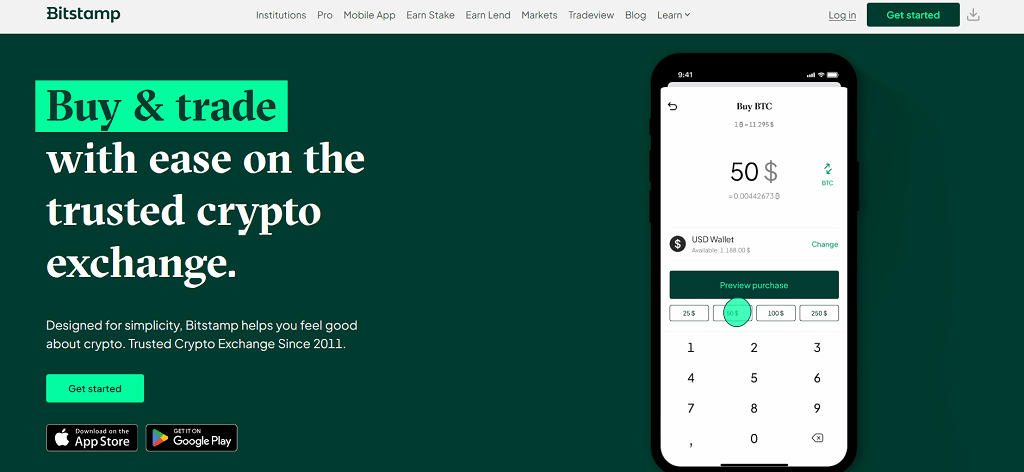
Overview
Founded in 2011, Bitstamp is one of the oldest cryptocurrency exchanges, known for its security and reliability.
Key Features
- User-friendly platform
- Low trading fees across the board
- Offers a mobile app for trading
Fees
Maker fees range from 0.50% to 0.10%, and taker fees range from 0.50% to 0.20%, decreasing with higher trading volumes.
Security Measures
Bitstamp employs strong security measures, including two-factor authentication and cold storage for user funds.
Supported Cryptocurrencies
Supports a selection of popular cryptocurrencies, including Bitcoin, Ethereum, and Ripple.
User Experience
Bitstamp offers a straightforward interface that appeals to both beginners and experienced traders.
Pros and Cons
- Pros: Strong security measures, user-friendly interface, low fees.
- Cons: Limited trading options compared to other exchanges.
Who Should Use This Exchange?
Best suited for users looking for a reliable and secure platform with low fees.
Conclusion
Bitstamp’s commitment to security and user experience makes it a reputable choice for cryptocurrency trading.
Bybit
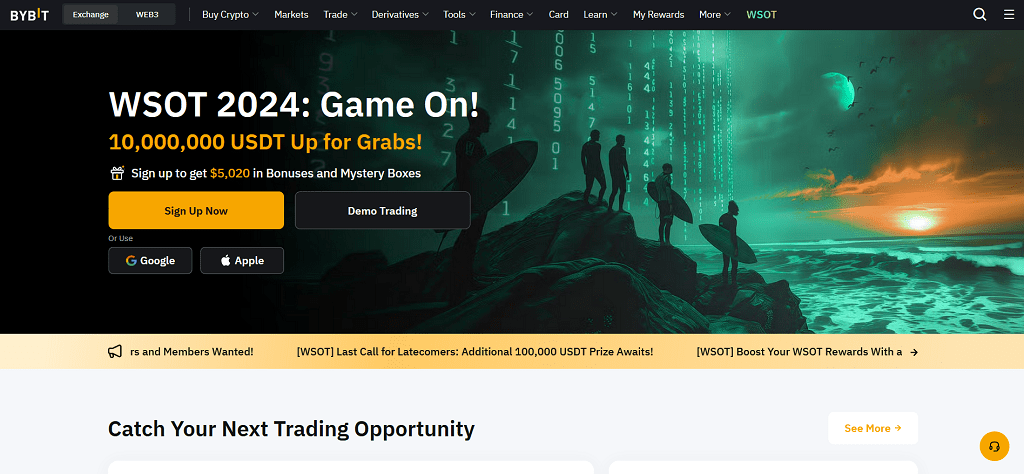
Overview
Bybit is a cryptocurrency exchange that specializes in derivatives trading, particularly margin trading and futures contracts.
Key Features
- Advanced trading tools and a focus on margin trading
- High liquidity and performance
- User-friendly interface
Fees
Maker fee is -0.025% (rebate) and taker fee is 0.075%.
Security Measures
Bybit prioritizes user security with measures such as two-factor authentication and cold storage.
Supported Cryptocurrencies
Includes popular cryptocurrencies like Bitcoin and Ethereum.
User Experience
Designed for traders who prefer advanced features and a focus on derivatives.
Pros and Cons
- Pros: Specialization in margin trading, high liquidity, and performance.
- Cons: Limited selection of cryptocurrencies compared to competitors.
Who Should Use This Exchange?
Ideal for experienced traders focused on margin trading and derivatives.
Conclusion
Bybit is a strong option for traders seeking a dedicated platform for margin trading with advanced features.
OKX

Overview
OKX is a leading global cryptocurrency exchange known for its extensive trading offerings, including a variety of instruments like futures and margin trading.
Key Features
- Over 400 cryptocurrency pairs
- Advanced trading options
- Strong focus on user security
Fees
Maker fees range from 0.10% to 0.06%, and taker fees vary from 0.15% to 0.10%, depending on trading volume.
Security Measures
OKX employs advanced encryption technologies and multi-level authentication, ensuring robust protection for user assets.
Supported Cryptocurrencies
Supports a wide range of cryptocurrencies, including Bitcoin and Ethereum.
User Experience
While the platform offers a plethora of features, some users may find the initial setup challenging due to its complexity.
Pros and Cons
- Pros: Comprehensive trading options, high-security standards, global presence.
- Cons: Complexity for beginners, potential regulatory restrictions in certain countries.
Who Should Use This Exchange?
Ideal for experienced traders looking for a wide range of trading instruments and a secure environment.
Conclusion
OKX stands out for its diversity and security, making it a reliable choice for traders worldwide.
BitMart
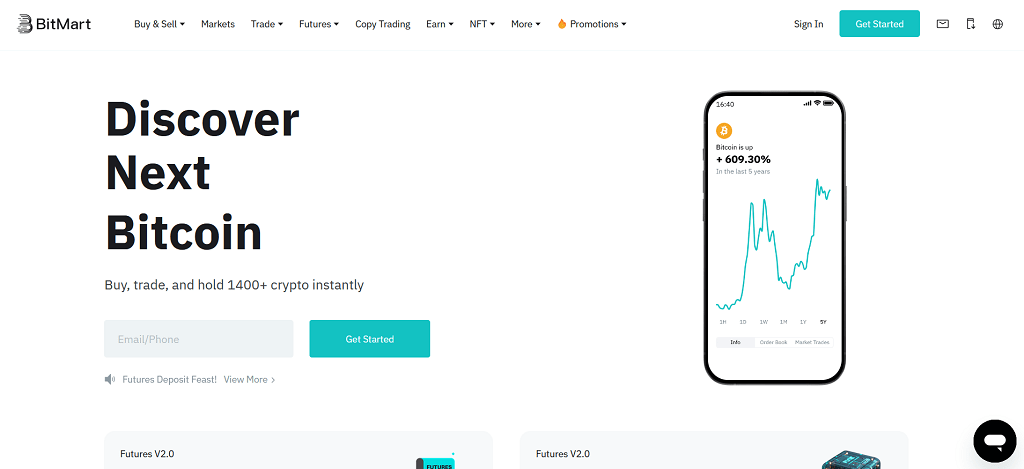
Overview
BitMart is a cryptocurrency exchange known for its user-friendly interface and broad range of supported cryptocurrencies.
Key Features
- Supports a wide variety of cryptocurrencies
- User-friendly trading platform
- Offers staking options for users
Fees
BitMart charges competitive trading fees, typically around 0.10% for both maker and taker transactions.
Security Measures
The platform incorporates various security measures, including two-factor authentication and regular audits.
Supported Cryptocurrencies
Offers a selection of popular and emerging cryptocurrencies, appealing to a diverse user base.
User Experience
BitMart’s interface is straightforward, making it accessible for beginners while still offering features for advanced traders.
Pros and Cons
- Pros: User-friendly design, diverse crypto offerings, staking options.
- Cons: Relatively lower liquidity compared to larger exchanges, potential security risks.
Who Should Use This Exchange?
Best for users looking for a straightforward trading experience with a diverse selection of cryptocurrencies.
Conclusion
BitMart's combination of user-friendly design and diverse offerings makes it a solid choice for crypto enthusiasts.
Best Cryptocurrency Exchanges for Beginners
When stepping into the world of cryptocurrency, choosing the right exchange is crucial for new traders. The best crypto platforms for beginners are those that offer user-friendly interfaces, robust security measures, and comprehensive educational resources. Here are some top picks that cater specifically to newcomers in the digital currency trading landscape.
Coinbase is a standout choice for beginners, thanks to its intuitive platform and strong security protocols. Founded in 2012, it has become synonymous with ease of use in digital currency trading. With over 240 cryptocurrencies available, users can easily buy, sell, and store digital assets. Although Coinbase's fees can be somewhat confusing, they are transparently displayed before each transaction, making it easier for users to understand costs. Additionally, the platform offers a staking program that allows users to earn rewards on their holdings, providing a gentle introduction to the potential of crypto investing.
Another excellent option is Gemini, which is tailored for those who prioritize security. This exchange provides a simple user interface while maintaining high security standards. With around 70 cryptocurrencies to choose from, Gemini also features a rewards program that allows users to earn interest on specific tokens. Notably, Gemini is available in all 50 states, ensuring that more beginners can access its services. Despite its security focus, the platform’s slightly higher fees may be a consideration for new traders.
Kraken is another strong contender, particularly for those looking for low fees and a wide range of cryptocurrency options. Established in 2011, it has built a reputation as one of the most reliable exchanges in the industry. Kraken offers two platforms: a basic interface for beginners and Kraken Pro for advanced users. This flexibility allows newcomers to start simple and explore more complex trading options as they gain experience. The exchange supports over 200 cryptocurrencies, making it an appealing choice for those wanting to explore various digital assets.
Crypto.com deserves mention for its extensive cryptocurrency offerings and competitive fees. With over 350 cryptocurrencies available, it caters to a wide audience, from casual traders to serious investors. The platform’s mobile app provides an excellent user experience, allowing users to trade on the go. Although there are some complexities regarding its fee structure, the platform also offers rewards and cash back through its Visa card, making it an attractive option for beginners looking to integrate crypto into their daily lives.
The best crypto platforms for beginners are those that offer user-friendly experiences, robust security, and a diverse range of cryptocurrencies. By choosing a platform like Coinbase, Gemini, Kraken, or Crypto.com, new traders can navigate the crypto landscape more confidently, armed with the necessary tools and resources to make informed decisions. As always, it's vital for newcomers to do their research and choose the platform that aligns best with their trading goals and preferences.
Best Crypto Trading Platforms for Low Fees
For many traders, especially those just starting, keeping costs down is a top priority when choosing a crypto trading platform. Fortunately, several exchanges stand out for their low fees while providing robust features and a diverse selection of cryptocurrencies. Here are some of the best options for traders looking to minimize costs.
Kraken is widely recognized as one of the leading platforms for low trading fees. Established in 2011, Kraken offers a tiered fee structure that rewards high-volume traders with discounts. For instance, its maker fees can drop to as low as 0.00%, while taker fees can be as low as 0.10% for traders with significant monthly volumes. This makes it an ideal choice for active traders who seek to capitalize on price fluctuations without worrying about high costs eating into their profits. Many users appreciate the platform's comprehensive educational resources, which help them navigate the complexities of cryptocurrency trading while saving on fees.
Another excellent choice is Binance, known for its competitive fee structure and wide variety of cryptocurrencies. With fees starting at just 0.10% for both makers and takers, Binance consistently ranks among the most cost-effective platforms in the industry. The exchange also offers volume discounts and additional savings for users who pay trading fees with its native token, BNB. Despite occasional concerns over regulatory issues, Binance remains a popular option for many traders, particularly those who value a vast selection of trading pairs and features.
Crypto.com is also noteworthy for its low fees, particularly for those who utilize its various products. The platform has a straightforward fee structure, with maker fees as low as 0.00% and taker fees starting at 0.075%. This makes it accessible for both casual traders and those looking to engage in more serious investing. Crypto.com further incentivizes users with its Visa card, offering up to 8% cash back on purchases, making it an attractive option for individuals seeking both trading flexibility and rewards.
Bitstamp, one of the oldest players in the crypto space, is another strong contender for low fees. It features a simple fee structure that is competitive, with maker fees starting at 0.50% and decreasing with higher trading volumes. Bitstamp's commitment to transparency and security also earns it trust among users, making it a reliable choice for those who prioritize low costs alongside a solid reputation.
In summary, platforms like Kraken, Binance, Crypto.com, and Bitstamp provide excellent options for traders focused on minimizing fees. By choosing an exchange that aligns with their trading style and volume, users can ensure they retain more of their profits while exploring the exciting world of cryptocurrency trading. As always, it's wise for traders to consider their individual needs and conduct thorough research before selecting a platform that suits them best.
Secure Crypto Platforms for Safe Trading
When it comes to trading cryptocurrencies, security should be at the forefront of every trader's mind. The rise of crypto has unfortunately brought along its fair share of scams and hacks, making it essential to choose an exchange that prioritizes safety. Here are some of the most secure cryptocurrency exchanges available, offering peace of mind alongside robust trading options.
Gemini is often hailed as a leader in security within the cryptocurrency space. Founded by the Winklevoss twins in 2014, this exchange emphasizes compliance with regulatory standards and has earned a reputation for its high-security measures. Gemini offers features like two-factor authentication and cold storage for the majority of its users' funds, significantly reducing the risk of theft. Users appreciate Gemini's commitment to security, with many citing the peace of mind that comes from knowing their assets are protected by robust safeguards.
Kraken is another top choice for secure trading. With a history dating back to 2011, Kraken has established itself as one of the most reputable exchanges in the industry. The platform is known for its strong security protocols, including two-factor authentication, withdrawal whitelists, and an extensive compliance program. Kraken's approach to user safety is commendable, with the exchange frequently sharing insights into its security practices. Many users highlight Kraken's reliability, especially during volatile market conditions.
Crypto.com has also gained traction as a secure option for digital asset trading. The platform employs various security measures, including two-factor authentication and multi-signature wallets, to protect user assets. Crypto.com has invested significantly in cybersecurity, including acquiring insurance policies to cover potential losses from hacks. This commitment to security has earned it a loyal user base, with many praising the platform for its user-friendly interface and robust safety features.
Finally, Bitstamp, one of the oldest exchanges in operation, has a solid track record for security. The platform implements strong safety measures such as two-factor authentication and cold storage of funds. Users appreciate Bitstamp's transparency regarding its security practices and its regular audits, which enhance trust in the platform. Many find Bitstamp's interface intuitive and straightforward, making it a reliable choice for both new and experienced traders.
Exchanges like Gemini, Kraken, Crypto.com, and Bitstamp exemplify the importance of security in digital asset trading. By prioritizing safety through advanced security measures and a commitment to compliance, these platforms provide users with the confidence needed to navigate the crypto market. As you consider your trading options, remember that a secure exchange not only protects your assets but also enhances your overall trading experience.
Best Platforms for Altcoin Trading
When diving into the world of cryptocurrencies, many traders are eager to explore beyond the usual Bitcoin and Ethereum. This curiosity leads them to altcoins, which often present unique opportunities for growth and investment. To help you navigate this vibrant market, here are some of the top platforms specifically tailored for altcoin trading.
KuCoin stands out as a premier destination for altcoin enthusiasts. With over 700 cryptocurrencies available for trading, it offers one of the most extensive selections on the market. This platform caters not just to established altcoins but also to many newer, niche options that aren't found elsewhere. KuCoin's user-friendly interface and low trading fees make it an attractive choice for both beginners and seasoned traders. Users often praise KuCoin for its comprehensive trading tools, including futures and margin trading, allowing them to leverage their altcoin investments effectively.
Binance is another heavyweight in the altcoin arena, boasting a vast library of over 350 supported cryptocurrencies. Known for its low fees and high liquidity, Binance has established itself as a go-to exchange for traders looking to capitalize on altcoin movements. Many users appreciate the platform's advanced trading features, such as charting tools and various order types, which empower them to make informed trading decisions. While some traders express concerns about regulatory issues in certain regions, the platform's extensive offerings and competitive fees continue to attract a broad user base.
BitMart also deserves mention as a fantastic platform for altcoin trading. With access to more than 1,500 cryptocurrencies, it is well-suited for those looking to discover emerging projects. BitMart’s interface is designed to cater to both novice and experienced traders, making it easy to explore various trading pairs. Users frequently highlight the platform's commitment to providing a broad selection of altcoins, making it a valuable resource for diversifying their portfolios. However, traders should remain aware of the platform's past security incidents and do their due diligence before investing.
Lastly, Crypto.com has rapidly become a popular choice for altcoin traders, offering a wide range of digital assets alongside unique features like its Crypto.com Visa Card, which allows users to spend their crypto effortlessly. The platform supports over 350 cryptocurrencies and has a reputation for low fees, especially for higher-volume traders. Users often share positive experiences regarding the seamless integration of various financial services, making it a convenient option for managing their altcoin investments.
Platforms like KuCoin, Binance, BitMart, and Crypto.com provide a wealth of options for altcoin trading, each with its unique strengths. Whether you're looking for a vast selection of cryptocurrencies, low fees, or advanced trading features, these platforms can enhance your trading experience and help you uncover new opportunities in the altcoin market. As you venture into altcoin trading, consider these platforms to maximize your potential for success.
Advanced Trading Features for Experienced Traders
For seasoned traders navigating the cryptocurrency landscape, the ability to access advanced trading features can make all the difference in optimizing strategies and enhancing profitability. Here, we explore some of the standout platforms offering these essential tools.
Kraken has built a solid reputation among experienced traders, thanks to its comprehensive suite of advanced features. The platform supports margin trading, allowing users to borrow funds to amplify their trading positions. Kraken also offers futures trading, providing opportunities to capitalize on price movements without holding the underlying asset. Users often commend the Pro version for its customizable dashboard, extensive charting tools, and a wide range of order types, enabling precise execution strategies. A trader shared that using Kraken's advanced order types helped him mitigate risks during volatile market conditions, significantly improving his overall trading performance.
Binance, another heavyweight in the crypto space, offers an array of sophisticated trading tools. Its advanced interface includes features like stop-limit orders, which allow traders to set specific entry and exit points, enhancing their ability to react to market fluctuations. Furthermore, Binance's extensive liquidity and low fees create a conducive environment for high-frequency trading, which experienced traders often rely on. Many users have reported that Binance's charting tools and technical analysis indicators are invaluable for conducting in-depth market research before executing trades.
Bybit stands out for its focus on derivatives trading, appealing to those looking to engage in futures and perpetual contracts. The platform boasts a user-friendly interface designed for high-speed trading, making it suitable for day traders and those utilizing short-term strategies. Bybit's advanced features, such as leverage of up to 100x, empower experienced traders to maximize their potential returns. However, users should be mindful of the inherent risks associated with high leverage. One trader highlighted how Bybit’s intuitive design allowed him to swiftly adjust his positions during market surges, ultimately leading to successful trades.
Crypto.com also offers advanced trading capabilities that cater to experienced users. With features like limit orders, stop-loss orders, and advanced charting tools, traders can execute their strategies with precision. Moreover, Crypto.com provides access to a wide range of trading pairs and innovative products like crypto credit cards and staking options, allowing users to diversify their portfolios effectively. A user mentioned that the comprehensive features offered by Crypto.com enabled her to seamlessly switch between trading and using crypto for daily transactions, enhancing her overall experience.
Platforms like Kraken, Binance, Bybit, and Crypto.com provide a wealth of advanced trading features that cater specifically to experienced traders. By leveraging these tools, traders can refine their strategies, react swiftly to market changes, and ultimately enhance their trading success. Whether you're looking for margin trading, sophisticated order types, or high leverage, these platforms can empower you to take your trading game to the next level.
Mobile-Friendly Crypto Trading Apps
In today's fast-paced world, the ability to trade cryptocurrencies on the go is essential for many investors. Mobile-friendly trading apps allow users to monitor the markets, execute trades, and manage their portfolios right from their smartphones. Here, we highlight some of the best mobile apps for crypto trading that cater to different needs.
Crypto.com has gained significant traction as a top choice for mobile trading. Its app offers a seamless user experience, allowing users to buy, sell, and trade over 350 cryptocurrencies with just a few taps. The platform also includes features like price alerts, which notify users of significant market movements, and a crypto debit card for spending digital assets. A user shared how the Crypto.com app's ease of use enabled him to quickly buy Bitcoin during a market dip, capitalizing on the opportunity without needing to access a desktop.
Coinbase is another popular app, particularly for those new to cryptocurrency. Known for its user-friendly interface, the Coinbase app simplifies the trading process, making it easy for beginners to navigate through various cryptocurrencies. It also provides educational resources, allowing users to learn while they trade. One satisfied user recounted how she felt empowered to start her crypto journey, thanks to the app's intuitive design and informative tutorials.
For those seeking a robust trading platform with advanced features, Binance offers a powerful mobile app. It supports a vast array of trading pairs and provides access to features such as futures trading and advanced charting tools. The app’s design is particularly appealing to experienced traders, as it retains much of the functionality found on the desktop version. Users appreciate the ability to conduct detailed technical analysis and execute trades swiftly, regardless of their location.
Gemini stands out for its strong emphasis on security and regulatory compliance. The Gemini mobile app allows users to trade and store cryptocurrencies safely, making it an excellent choice for those concerned about security. With its sleek interface and easy navigation, the app caters to both beginners and seasoned traders. A trader noted how the app’s security features gave him peace of mind, allowing him to focus on making informed trading decisions without worrying about the safety of his assets.
Mobile-friendly cryptocurrency trading apps like Crypto.com, Coinbase, Binance, and Gemini offer users the flexibility and convenience to trade cryptocurrencies on the go. With their user-centric designs, advanced features, and robust security measures, these apps make it easier than ever to participate in the cryptocurrency market, ensuring that investors can stay informed and act quickly, no matter where they are. Whether you’re a beginner or an experienced trader, there’s a mobile app tailored to your needs, helping you make the most of your digital asset trading journey.
How to Choose the Right Crypto Exchange for Your Needs
Selecting the right crypto marketplace can be a daunting task, especially with so many options available today. Each platform has unique features, benefits, and limitations that cater to different types of traders. Here’s a guide to help you navigate the process and find the exchange that best aligns with your trading goals.
Evaluate Your Trading Experience
Begin by considering your level of experience. If you’re a beginner, look for an exchange with a user-friendly interface and educational resources. Platforms like Coinbase are designed for newcomers, offering straightforward navigation and helpful tutorials that make it easy to start trading. A beginner shared her experience of feeling overwhelmed by the complexity of digital asset trading until she discovered Coinbase, which simplified the process and empowered her to make her first trades confidently.
Consider the Range of Available Cryptocurrencies
Next, think about the cryptocurrencies you want to trade. Some exchanges specialize in a wide variety of altcoins, while others focus primarily on major cryptocurrencies like Bitcoin and Ethereum. Binance and KuCoin, for example, are known for their extensive lists of altcoins, making them ideal for traders looking to diversify their portfolios. If you have specific coins in mind, ensure the exchange you choose supports them.
Look for Competitive Fees
Trading fees can vary significantly between exchanges and can impact your profitability. If you plan on making frequent trades, opting for a platform with low fees is crucial. Kraken is renowned for its competitive fee structure, especially for high-volume traders, allowing them to save significantly on transaction costs. A user shared how switching to Kraken from a higher-fee exchange improved his overall trading profitability, making it easier to grow his investments.
Security Features Matter
In the crypto space, security is paramount. Research the security protocols an exchange has in place to protect your funds. Look for exchanges that offer two-factor authentication, cold storage for assets, and insurance for user funds. Gemini is often praised for its security measures and regulatory compliance, making it a trusted option for those prioritizing safety. A trader emphasized how Gemini’s robust security features gave him peace of mind, enabling him to focus on trading without worrying about potential hacks.
Customer Support and Resources
Finally, consider the level of customer support available. If you’re new to digital asset trading or anticipate needing assistance, look for exchanges that offer responsive customer service. Some platforms, like Crypto.com, provide a variety of support options, including live chat and comprehensive FAQs. A user recounted how prompt customer support helped him resolve an issue quickly, allowing him to continue trading without unnecessary delays.
Choosing the right cryptocurrency marketplace involves evaluating your trading experience, considering the cryptocurrencies you wish to trade, examining fee structures, ensuring strong security features, and assessing customer support. By taking the time to analyze these factors, you can find a platform that not only meets your needs but also enhances your trading experience. Whether you’re just starting or looking to expand your trading horizons, the right exchange can make all the difference in your cryptocurrency journey.
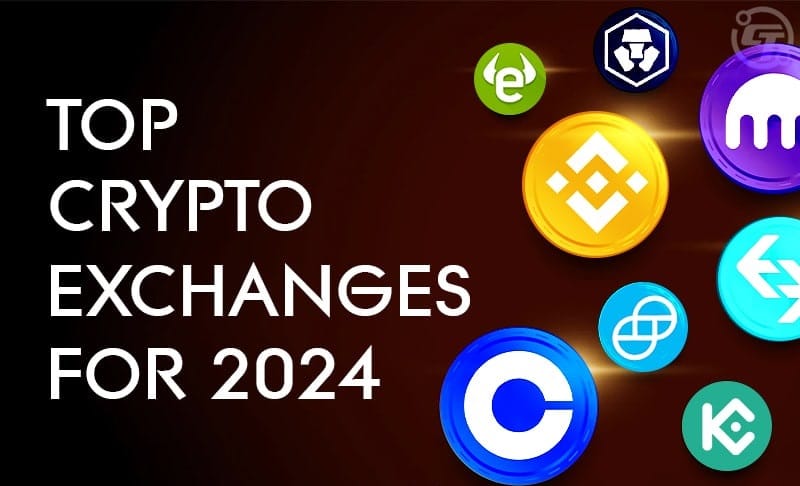
Conclusion: The Future of Crypto Trading Exchanges in 2024
As we wrap up our exploration of the best cryptocurrency marketplaces and trading apps for 2024, it's clear that choosing the right platform is essential for successful trading and investing in the ever-evolving cryptocurrency landscape. With insights drawn from reputable sources like Forbes, Investopedia, NinjaPromo, and NerdWallet, we've highlighted platforms that cater to both beginners and seasoned traders, emphasizing the importance of security, fees, and user experience.
The cryptocurrency market is rapidly maturing, and the best exchanges are continuously innovating to meet the diverse needs of users. Whether you prioritize low fees, security, or a wide selection of cryptocurrencies, platforms like Kraken, Coinbase, Binance, and Crypto.com stand out as leaders in providing valuable features for all types of traders. Each platform offers a unique blend of advantages, ensuring that there’s a suitable option for every trading style.
Looking ahead, we can expect the landscape of cryptocurrency marketplaces to continue evolving with advancements in technology, regulatory developments, and increasing demand for user-friendly services. As platforms prioritize enhanced security measures, competitive fee structures, and mobile accessibility, traders will have more tools at their disposal to navigate the complex world of cryptocurrency trading effectively.
In conclusion, the future of cryptocurrency trading exchanges in 2024 promises exciting opportunities for those willing to engage in this dynamic market. By staying informed and choosing the right platform based on your individual needs, you can position yourself for success in the world of cryptocurrency trading. Embrace the changes, stay proactive, and prepare for a rewarding journey in the evolving crypto landscape.
FAQs About Cryptocurrency Trading and Exchanges
As the popularity of cryptocurrency continues to grow, many people have questions about how to navigate this exciting but complex landscape. Here, we address some of the most frequently asked questions about cryptocurrency trading and exchanges to help you make informed decisions.
What is a cryptocurrency exchange?
A cryptocurrency exchange is an online platform where users can buy, sell, and trade cryptocurrencies. These exchanges function similarly to stock exchanges, acting as intermediaries between buyers and sellers. They facilitate transactions, provide market data, and often offer additional features like wallets and security measures. Users can create accounts, fund them with fiat or digital currencies, and start trading a variety of cryptocurrencies.
How do I choose the right crypto platform?
When selecting a crypto digital asset exchange, consider your trading experience, the range of cryptocurrencies offered, fees, security measures, and user support. Beginners may prefer platforms with user-friendly interfaces, such as Coinbase, while experienced traders might lean towards exchanges like Binance or Kraken that offer advanced trading features and lower fees. It's crucial to assess what you value most in your trading journey to find the right fit.
Are cryptocurrency exchanges safe?
Safety is a top concern for many traders. Reputable exchanges implement strong security protocols, including two-factor authentication, cold storage for funds, and insurance policies to protect user assets. Platforms like Gemini and Kraken are often highlighted for their robust security measures. However, no exchange is entirely immune to risks, so it's essential to do your research and understand the security practices of any platform you consider.
What fees should I expect when trading?
Fees can vary significantly between exchanges. Most platforms charge trading fees, which may be a percentage of the transaction or a flat rate. For instance, Kraken offers competitive fees that decrease with higher trading volumes, while Binance is known for its low-cost structure. Additionally, be aware of potential withdrawal fees and other hidden costs that could impact your overall profitability.
Can I trade cryptocurrencies on my mobile device?
Absolutely! Many leading exchanges, such as Crypto.com, Coinbase, and Binance, offer mobile apps that provide a seamless trading experience. These apps enable users to monitor markets, execute trades, and manage portfolios from anywhere, making it convenient for traders who are always on the go. A user shared how trading on the Crypto.com app allowed him to capitalize on market movements while commuting, enhancing his trading efficiency.
What types of cryptocurrencies can I trade?
The types of cryptocurrencies available for trading depend on the exchange. Some platforms specialize in a wide array of altcoins, while others focus primarily on major currencies like Bitcoin and Ethereum. If you're interested in exploring new and emerging projects, exchanges like KuCoin and BitMart are excellent options, offering access to a broad selection of digital assets.
Is it possible to earn rewards on my crypto holdings?
Yes, many exchanges offer rewards programs for holding certain cryptocurrencies. For example, platforms like Coinbase and Gemini provide options for staking, allowing users to earn interest on their digital assets. This can be an appealing way to generate passive income while holding onto your investments.
What is the difference between centralized and decentralized exchanges?
Centralized exchanges (CEX) are managed by companies that facilitate trading and offer services like customer support and security measures. In contrast, decentralized exchanges (DEX) allow users to trade directly from their wallets without a central authority overseeing transactions. While DEXs provide more privacy and control over funds, CEXs typically offer better liquidity and user-friendly interfaces.
How do I start trading cryptocurrencies?
To start trading cryptocurrencies, you'll first need to choose a reputable exchange, create an account, and complete any necessary identity verification. After funding your account with fiat currency or another cryptocurrency, you can begin placing buy or sell orders for your desired digital assets. It’s advisable to familiarize yourself with the platform's features and trading tools before making your first trades.
What is a trading pair?
A trading pair consists of two different cryptocurrencies that can be traded against each other. For example, in the BTC/ETH pair, Bitcoin (BTC) is the base currency, while Ethereum (ETH) is the quote currency. The trading pair indicates how much of the quote currency is needed to buy one unit of the base currency. Understanding trading pairs is essential for executing trades on exchanges.
What are market orders and limit orders?
Market orders are executed immediately at the current market price, allowing traders to buy or sell assets quickly. In contrast, limit orders allow traders to specify a price at which they want to buy or sell. The order will only be executed when the market reaches that price. Limit orders can provide more control over trade execution, especially in volatile markets.
What should I do if I forget my password or lose access to my account?
Most exchanges have recovery options in place to help users regain access to their accounts. If you forget your password, you can typically use the "Forgot Password" feature to reset it via email or SMS. Additionally, enabling two-factor authentication can add an extra layer of security. If you're unable to recover your account through these methods, contacting the exchange's customer support is recommended.
How can I stay updated on cryptocurrency market trends?
Staying informed about market trends is crucial for successful trading. You can follow reputable news websites, subscribe to cryptocurrency newsletters, and engage with online communities on platforms like Reddit or Twitter. Many exchanges also provide market analysis and insights through their blogs or educational resources, helping you make informed trading decisions.
Is it necessary to have a wallet for my cryptocurrencies?
While exchanges offer built-in wallets for storing your digital assets, it's often recommended to use a separate wallet for enhanced security. Wallets come in different forms: hot wallets (online) and cold wallets (offline). Cold wallets provide higher security against hacks and breaches, making them a safer option for long-term storage of your cryptocurrencies.














Discussion